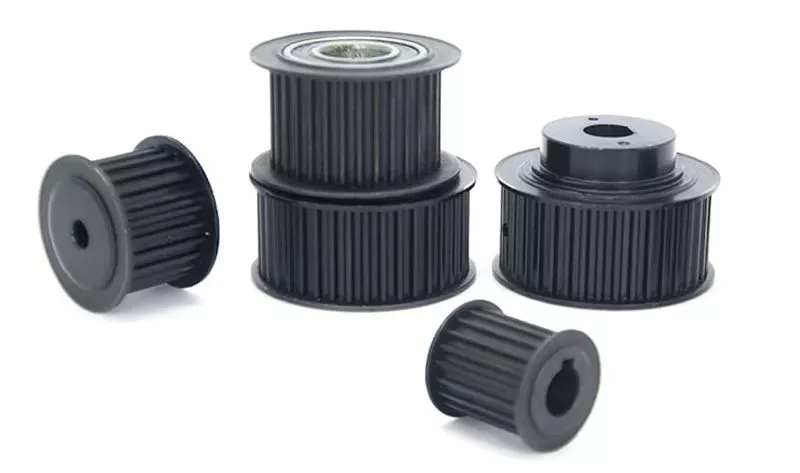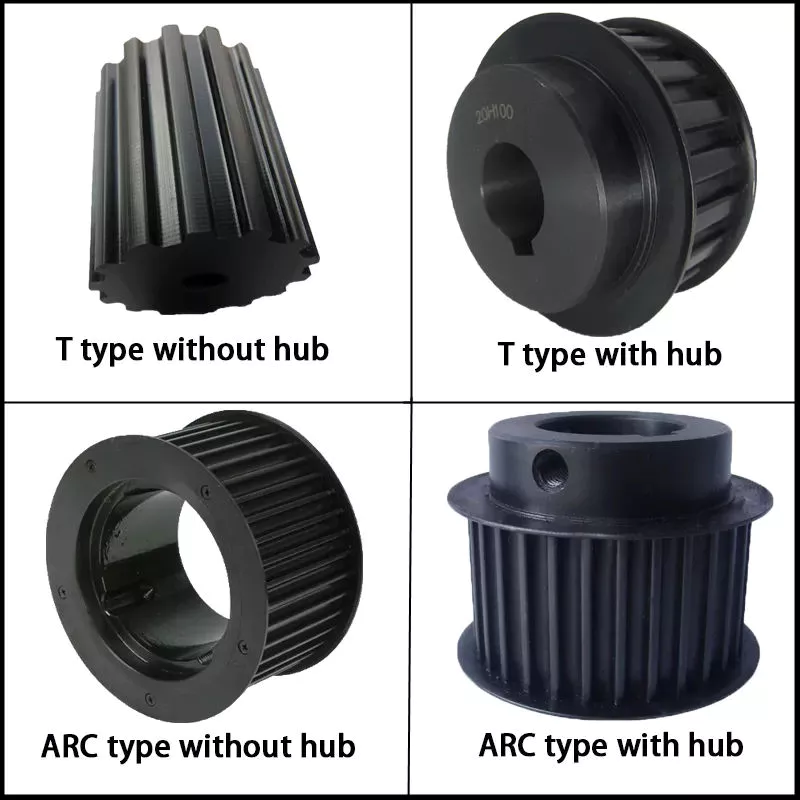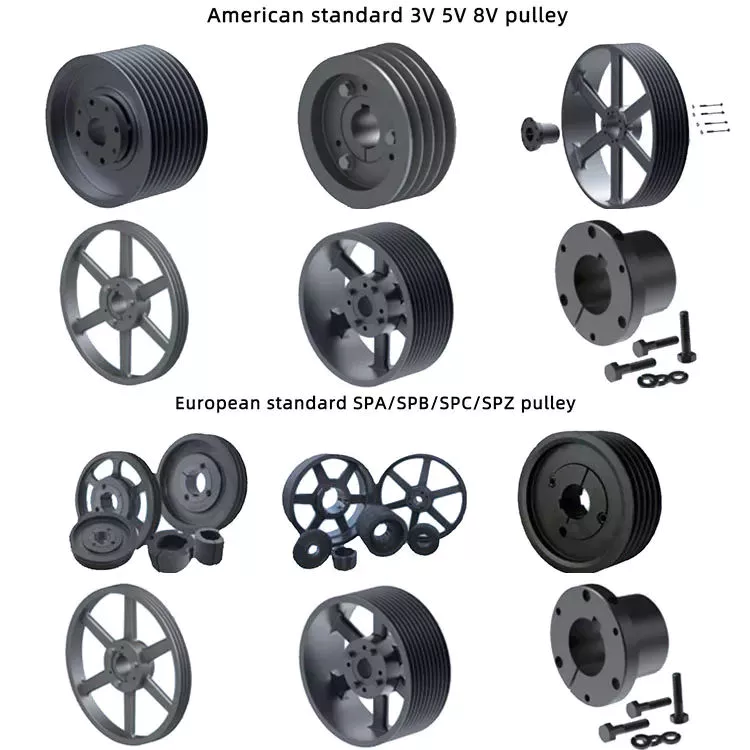Product Description
Good steel material pulley,specialized in tower crane and construction hoist.
most hot sale diameter:580mm,510mm,490mm,415mm,350mm,330mm,280mm.
We have all sizes of steel pulley for tower cranes, If you need other sizes, please contact us.
| Tower Crane steel Pulley | |||
| Brand Name | ZTM | ||
| Application | tower crane | ||
| Part name | Wire Rope Steel Pulley | ||
| Dimension | all size,580mm,510mm,490mm,415mm,350mm,330mm,280mm | ||
| status | in stock | ||
| warranty | 12 months | ||
| condition | 100% brand new | ||
| weight | 5kg | ||
We are a factory, so we can satisfy the non-standard customization of our products, because there is no intermediary trader, so we maximize the benefit of our customers.
ZheJiang CZPT Intelligence Equipment Co., Ltd.(ZTM) is a leading construction equipment manufacturer in the industry. Founded in 2003, the company specializes in the research, development and manufacturing of tower cranes and construction hoists. After years of climbing and breakthroughs, CZPT ranked as NO. 5 tower crane manufacturer and has also become a member of drafting industry-related standards in China.
With innovation and development for many years,ZTM specialized in hammer head tower crane series ,flat top and luffing tower crane series ,each series with a wide range of size and capacities,all strictly complies with European standard F.E.M 1.001.As a leading manufacturer in the industry,ZTM production facility cover an area of 200,000 square meter ,approximately 1100 employees included sales ,R &D ,after sales and technical support.We have been exported more than 80 countries and areas all over the world such as Korea,Malaysia,Viet nam,South America ,Middle East ,Southeast Asia etc.CZPT tower cranes are fitted with A to Z safety features to help increase safety for technicians ,operators in the work environment,safety access to all zones.
1. You are a trader or a manufacture?
We are an original Professional tower crane manufacturer.
Our factory located on Jingfa Avenue, Economic Development Zone, HangZhou, ZheJiang , China
2. How can I be sure the part will fit my tower crane?
Give us correct model number/machine serial number/ any numbers on the parts itself. Or measure the parts give us dimension or drawing.
3. How about the payment terms?
We usually accept T/T or Trade Assurance. other terms also could be negotiated.
4. What is your minimum order?
It depends on what you are buying. Normally, our minimum order is one 20' full container and LCL container (less than a container load) can be acceptable.
5. What is your delivery time?
FOB HangZhou or any Chinese port : 20 days . If there are any parts in stock , our delivery time is only 0-7 days.
6. What about Quality Control?
We have a perfect QC system for the perfect products. A team who will detect the product quality and specification piece carefully, monitoring every production process until packing is complete, to ensure product safety into container.
Any questions, please give us a message, hope can cooperate with you! and welcome to visit us!
CLICK HERE TO CONTACT US !!!
The importance of pulleys
A pulley is a wheel that rides on an axle or axle. The purpose of the pulley is to change the direction of the tensioning cable. The cable then transfers the power from the shaft to the pulley. This article explains the importance of pulleys and demonstrates several different uses for this machine. Also, see the Mechanical Advantages section below for the different types. let's start.
simple machine
A simple pulley machine is a device used to transfer energy. It consists of a wheel with flexible material on the rim and a rope or chain tied to the other end. Then lift the load using the force applied to the other end. The mechanical advantage of this system is one, as the force applied to the load is the same as the force on the pulley shaft.
A simple pulley machine has many benefits, from the ability to build pyramids to building modern buildings with it. Pulleys are also popular with children because they can perform simple tasks such as lifting toys onto a slide, sliding them off the slide, and lifting them up again. These activities, called "transportation" by child development theorists, allow them to learn about the physics of simple machines in the process.
The mechanism works by using cables to transmit force. The cable is attached to 1 side of the pulley and the other side is pulled by the user. Lift the load by pulling on 1 end and the other end of the rope. Simple pulley machines have many commercial and everyday applications, including helping move large objects. They can be fixed or movable, and can be a combination of both. The present invention is a great tool for any beginner or engineer.
axis
The axle wheel is the basic mechanical part that amplifies the force. It may have originally appeared as a tool to lift buckets or heavy objects from a well. Its operation is demonstrated by large and small gears attached to the same shaft. When applied to an object, the force on the large gear F overcomes the force W on the pinion R. The ratio of these 2 forces is called the mechanical advantage.
The ideal mechanical advantage of shaft pulleys is their radius ratio. A large radius will result in a higher mechanical advantage than a small radius. A pulley is a wheel through which a rope or belt runs. Often the wheels are interconnected with cables or belts for added mechanical advantage. The number of support ropes depends on the desired mechanical advantage of the pulley.
In the design of the axle wheel, the axle is the fulcrum and the outer edge is the handle. In simple terms, wheels and axle pulleys are improved versions of levers. The axle pulley moves the load farther than the lever and connects to the load at the center of the axle. Shaft pulleys are versatile and widely used in construction.
rope or belt
Ropes or pulleys are mechanical devices used to move large masses. The rope supports a large mass and can be moved easily by applying a force equal to 1 quarter of the mass to the loose end. Quad pulleys have 4 wheels and provide the mechanical advantage of 4 wheels. It is often used in factories and workshops. It is also a popular choice in the construction industry. If you are installing a pulley in your vehicle, be sure to follow these simple installation instructions.
First, you need to understand the basics of how a rope or pulley works. The machine consists of 1 or more wheels that rotate on an axle. The rope or belt is wrapped around the pulley and the force exerted on the rope is spread around the pulley. It then transfers the force from 1 end of the rope to the other. The pulley system also helps reduce the force required to lift objects.
Another common rope or pulley is the differential pulley. This is similar to a rope pulley, but consists of 2 pulleys of different radii. The tension in the 2 halves of the rope supports half the load that the live pulley should carry. These 2 different types of pulleys are often used together in composite pulley systems.
Mechanical advantage
The mechanical advantage is the ratio of the force used to move the load through the pulley system to the force applied. It has been used to measure the effectiveness of pulley systems, but it also requires assumptions about applied forces and weights. In a simple 1:1 pulley system, the weight lifting the weight is the same as the weight of the person pulling the weight. Adding mechanical advantage can help make up for the lack of manpower.
This advantage stems from the mechanical properties of simple machines. It requires less force and takes up less space and time to accomplish the same task. The same effect can also be achieved by applying less force at a distance. Furthermore, this effect is called the output force ratio. The basic working principle of a pulley system is a rope with a fixed point at 1 end. The movable pulley can be moved with very little force to achieve the desired effect.
The load can be moved through the vertical entry using a simple pulley system. It can use a simple "pulley block" system with a 2:1 "ladder frame" or a 4:1 with dual pulleys. This can be combined with another simple pulley system to create a compound pulley system. In this case, a simple pulley system is pulling another pulley, giving it a 9:1 mechanical advantage.
Commonly used
You've probably seen pulley systems in your kitchen or laundry room. You probably already use it to hang clothes on an adjustable clothesline. You may have seen motor pulleys in the kitchens of commercial buildings. You might even have seen 1 on a crane. These machines use a pulley system to help them lift heavy loads. The same goes for theaters. Some pulleys are attached to the sides of the stage, enabling the operator to move up and down the stage.
Pulley systems have many uses in the oil and petroleum industry. For example, in the oil and gas industry, pulley systems are used to lay cables. They are arranged in a pulley structure to provide mechanical energy. When the rope is running, 2 pulleys are hung on the derrick to facilitate smooth running. In these applications, pulleys are very effective in lifting heavy objects.
A pulley is a simple mechanical device that converts mechanical energy into motion. Unlike chains, pulleys are designed to transfer power from 1 location to another. The force required to lift an object with a pulley is the same as that required by hand. It takes the same amount of force to lift a bucket of water, but it's more comfortable to pull sideways. A bucket of water weighs the same as when lifted vertically, so it's easy to see how this mechanism can be useful.
Safety Notice
When using pulleys, you should take several safety precautions to keep your employees and other workers on the job site safe. In addition to wearing a hard hat, you should also wear gloves to protect your hands. Using pulleys can lead to a variety of injuries, so it's important to keep these precautions in mind before using pulleys. Here are some of the most common:
Pulleys are an important piece of equipment to have on hand when lifting heavy objects. Pulleys not only reduce the force required to lift an object, but also the direction of the force. This is especially important if you are lifting heavy objects, such as a lawn mower or motorcycle. Before starting, it is important to make sure that the anchoring system can support the full weight of the object you are lifting.
When using a pulley system, make sure the anchor points are adequate to support the load. Check with the pulley manufacturer to determine the weight it can safely lift. If the load is too large, composite pulleys can be used instead. For vertical lifts, you should use a sprocket set and wear personal protective equipment. Safety precautions when using pulleys are critical to worker health and safety.

